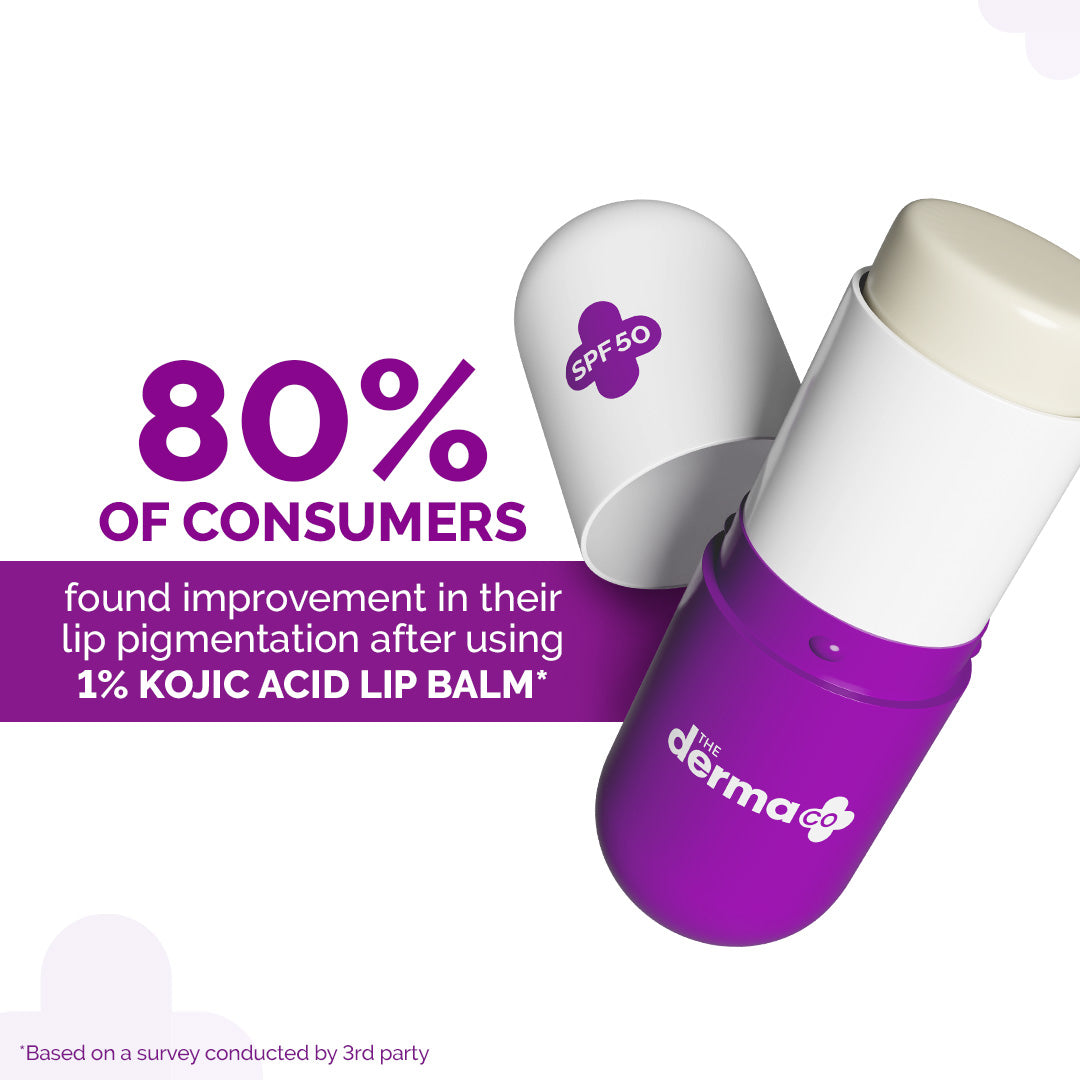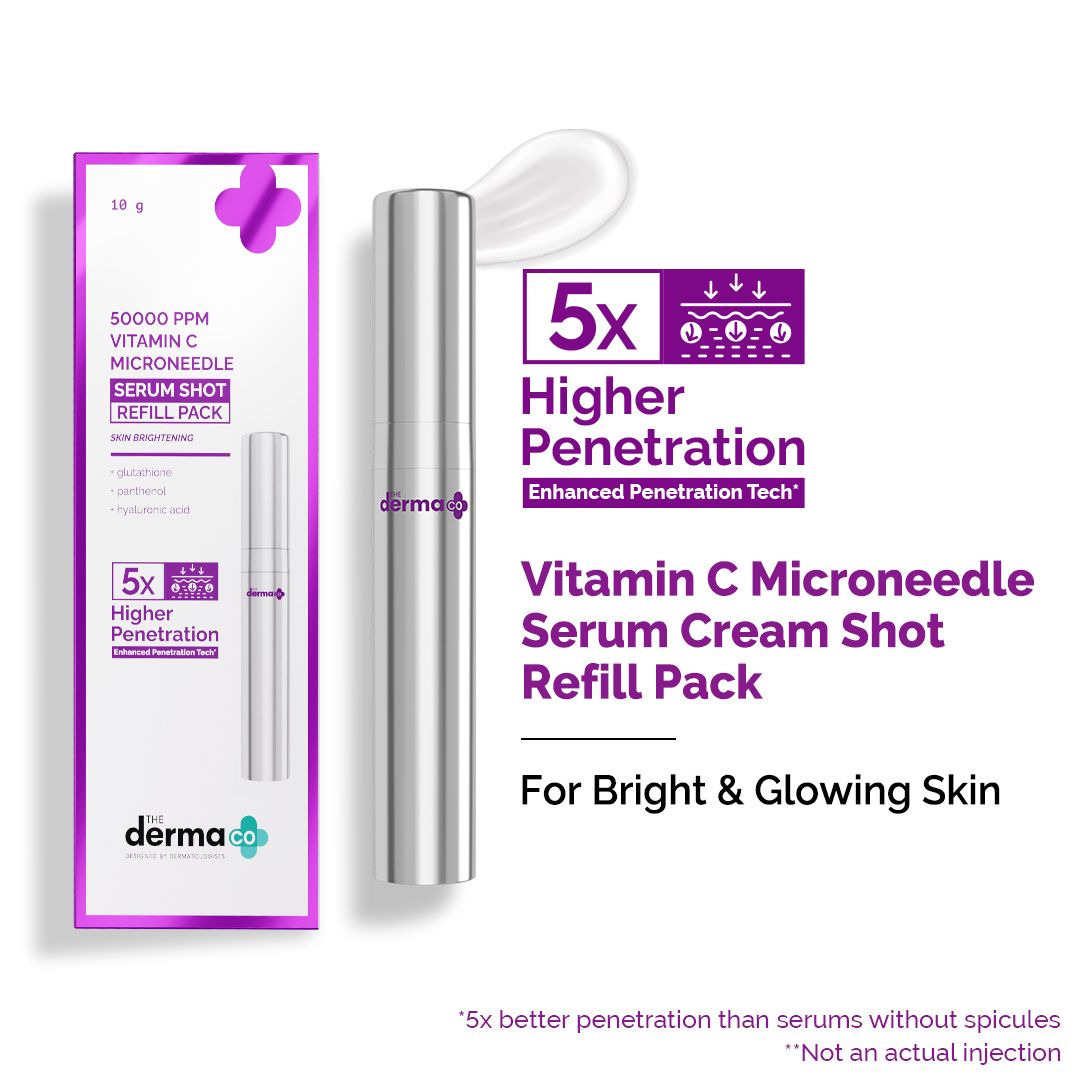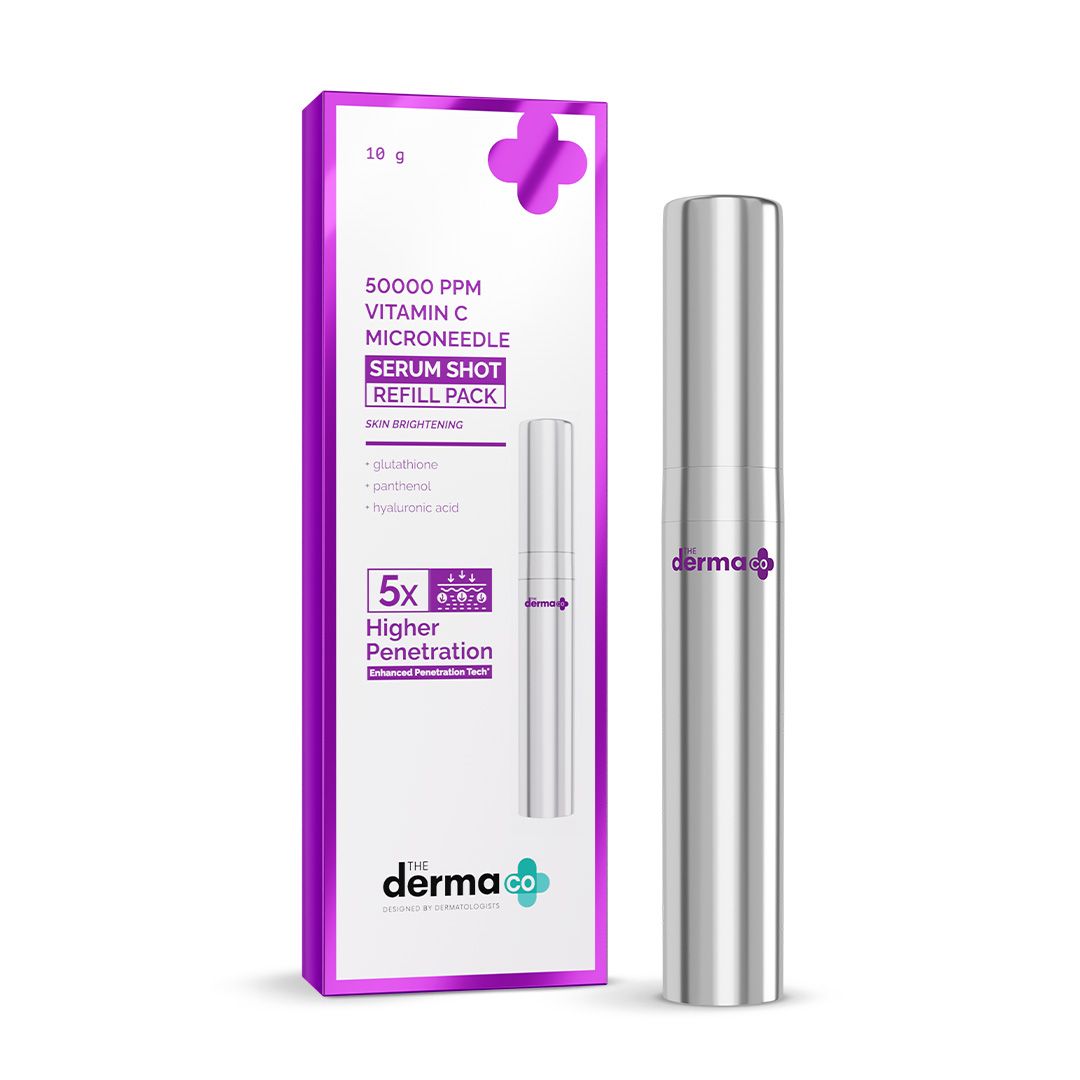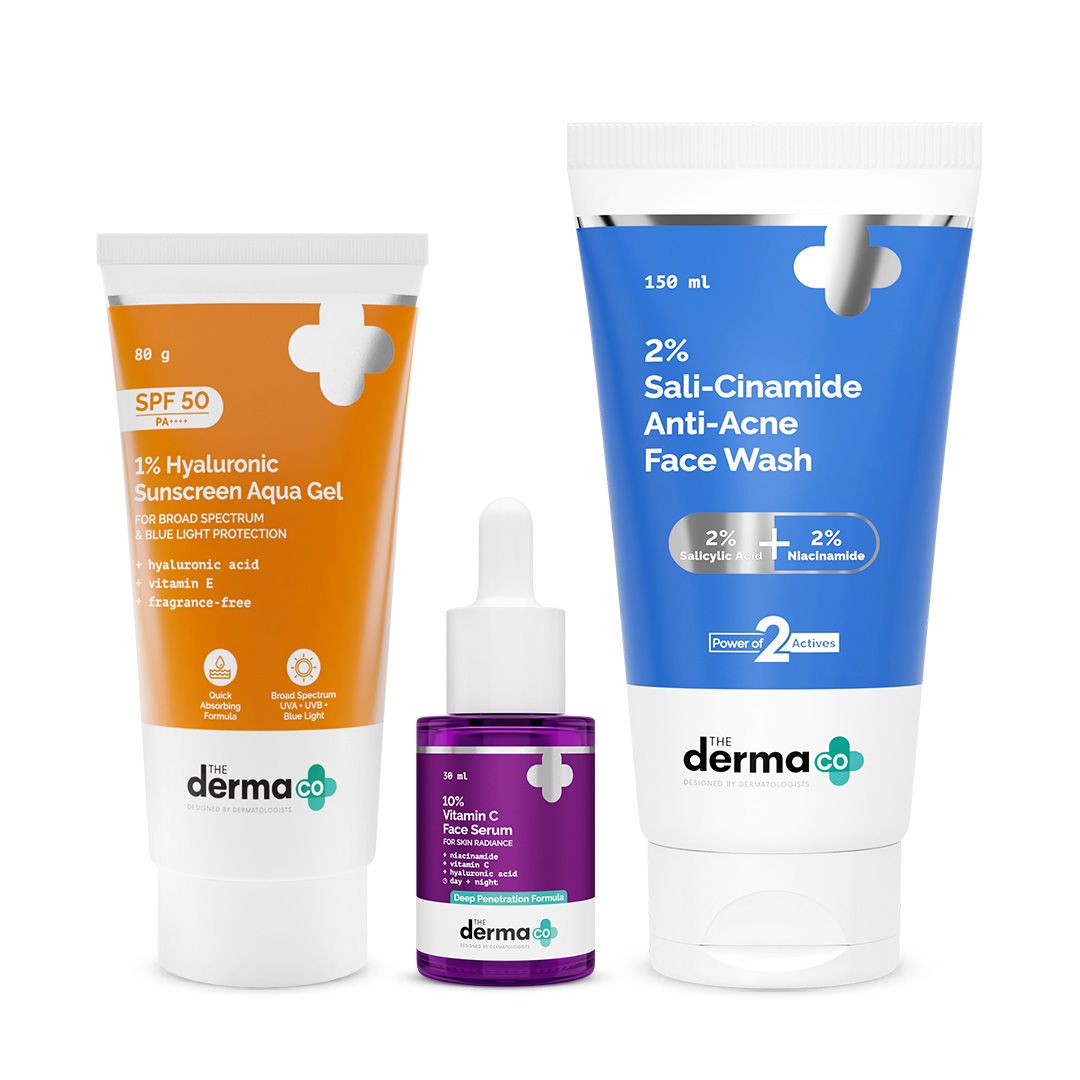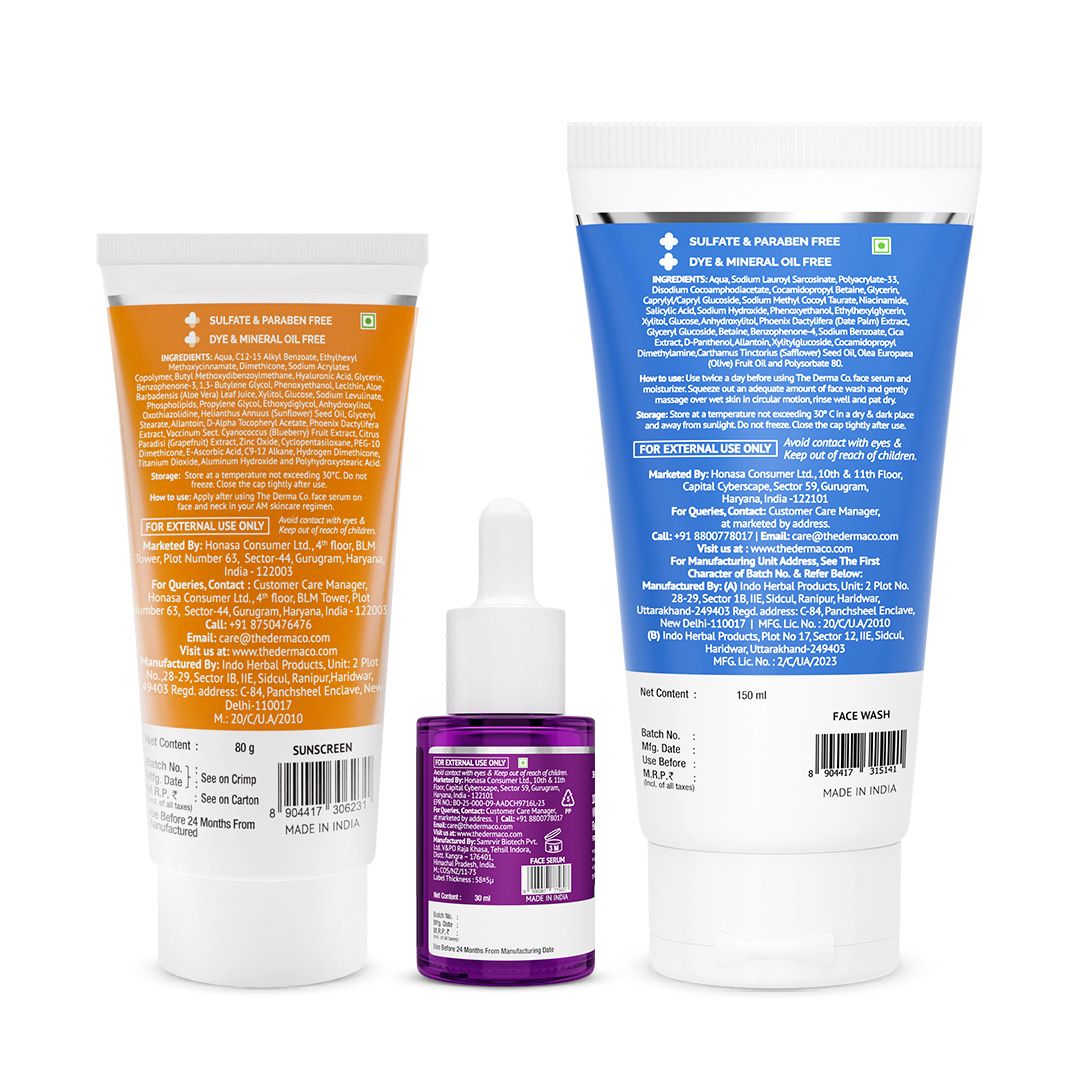Vitamin C for Skin
Filter
Sort by:
17 products for Vitamin C for Skin
FAQs
Vitamin C has several beneficial properties for the skin and is a potent antioxidant. It works well for hyperpigmentation because it lightens the complexion, lightens dark spots, and balances the skin tone by preventing melanin synthesis. Additionally, vitamin C increases collagen production, which keeps skin tight, enhances suppleness, and minimizes wrinkles. Although it doesn't act as sunscreen, vitamin C helps against sun damage by removing free radicals produced by UV exposure. Additionally, vitamin C benefits your skin by lessening inflammation and redness, making skin appear healthier and clearer. Its frequent usage helps maintain better skin health and encourages a radiant, young look.
For skin advantages, vitamin C is best used in the morning. Being a strong antioxidant, it helps shield your skin from environmental harm brought on by pollution, sun exposure all day, and free radicals. Use it before moisturizing and applying sunscreen but after cleaning and toning. Any sunscreen that contains vitamin C is more effective at controlling UV radiation. Applying Vitamin C for skin care works best for AM routines. At the same time, some individuals take it at night to help restore their skin. Whichever way you choose, you should make it a regular part of your regimen for the best outcomes because consistency is crucial.
Since it plays essential functions in antioxidant protection, skin health, and immunological support, vitamin C is vital for general health. By promoting white blood cell activity, it fortifies the immune system and aids in the body's defense against infections. Vitamin C benefits for skin too because it is a strong antioxidant that helps protect skin cells from free radical damage, which helps prevent signs of premature aging. It also promotes the manufacture of collagen, which is essential for strong bones, cartilage, and skin. Furthermore, using skincare products featuring Vitamin C for dark spots reduction lowers the risk of anemia by enhancing iron absorption from plant-based diets. Its regular consumption is essential for health and vigor and can be found in several citrus fruits, berries, and vegetables.
There are several advantages of applying vitamin C for face care. By slowing down melanin synthesis, it lightens the complexion, minimizes dark spots and makes the skin tone even. Vitamin C, a potent antioxidant, shields skin cells from environmental harm from pollutants and UV radiation. Additionally, it encourages collagen production, which keeps the skin tight, increases suppleness, and minimizes fine wrinkles. Among other Vitamin C uses for skin care is helping soothe acne-prone skin by lowering redness and irritation. Its frequent usage can lead to a younger, healthier glow and a brighter, more radiant complexion.
Yes, vitamin C can help skin become brighter and less tanned. Being a potent antioxidant, it prevents the synthesis of melanin, which helps diminish sun-induced hyperpigmentation. Vitamin C progressively lightens tan, exposing a more uniform skin tone by promoting skin cell turnover and lessening the visibility of dark patches. Additionally, it prevents skin from browning further by battling UV-induced free radical damage. Vitamin C doesn't, however, instantaneously remove suntan as its best effects come from using it consistently over time. It must be used with a dermatologically designed sunscreen to optimize the advantages of vitamin C and avoid further tanning.
Yes, vitamin C for hyperpigmentation helps to brighten and cleanse skin. Its antioxidant qualities shield skin cells from external stresses like pollution and UV radiation, which can cause dullness and imperfections. It helps achieve a more equal skin tone by preventing melanin synthesis, thus effectively lessening hyperpigmentation and dark patches. Additionally, it promotes collagen production, which enhances the firmness and texture of the skin and helps to even out uneven skin. Furthermore, vitamin C contains anti-inflammatory qualities that can assist skin prone to acne and lessen redness. It can result in a brighter, more radiant complexion and appears healthier with regular usage.
Vitamin C is a potent antioxidant that promotes skin vibrancy, immunological function, and general cellular defense. By fortifying white blood cells, it strengthens the immune system and helps in the body's defense against diseases and infections. Collagen formation, which is essential for healing wounds and improving skin elasticity, depends on vitamin C. Additionally, it improves iron absorption from plant-based diets, which lowers the risk of anemia. The primary use of Vitamin C protects cells from oxidative stress by scavenging free radicals, which leads to a healthier body and skin that looks younger and more vibrant.
Yes, because it has so many health advantages, vitamin C is good for daily usage. By boosting the immune system, it aids the body in fending against diseases and infections. By encouraging the creation of collagen, vitamin C applied daily to the skin can improve the skin's texture and brightness and help minimize symptoms of premature aging. Vitamin C can also lessen hyperpigmentation and shield the skin from environmental harm. Consuming foods rich in vitamin C, such as bell peppers, citrus fruits, and strawberries, improves general health and well-being. Including vitamin C in your everyday regimen might result in a stronger immune system and better skin.
Yes, vitamin C is perfect for the health of the face and skin. As a potent antioxidant, it shields the skin from harm from pollutants and UV radiation. By preventing melanin synthesis, it helps lighten the complexion by lowering hyperpigmentation and dark patches for a more attractive skin tone. Additionally, it helps promote collagen production to increase skin suppleness and reduce the appearance of fine lines and wrinkles. Vitamin C is rich in anti-inflammatory properties and using it for skin helps calm sensitive skin and lessen redness. Frequent use can generally enhance skin texture and a glowing, young complexion.
Vitamin C, also known as Ascorbic Acid, is a versatile water-soluble vitamin that is naturally found in citrus fruits, certain vegetables, etc. Its oral intake is often prescribed as a dietary supplement and used to treat and prevent diseases like scurvy. Equally significant is its role in skincare. This ingredient's antioxidative benefits make it a crucial component in producing a wide range of skincare products, from face cleansers to moisturizers for daily use.
Yes. Vitamin C offers long-lasting skincare benefits to maintain happy and healthy skin. Its antioxidative properties make it a key ingredient in daily skincare essentials like face cleansers, moisturizers, lotions, and many more. It helps brighten the skin and adds a lasting radiance to the skin effortlessly. Vitamin C for skin works wonders for maintaining skin health as it helps treat various skin conditions like hyperpigmentation, dark spots, age spots, blemishes, and many more to promote an even skin tone. If you want a good skin hydration product rich in Vitamin C's benefits, we recommend trying The Derma Co 20% Vitamin C Face Serum. It is crafted with amazing ingredients like Ferulic Acid, Hyaluronic Acid, and Vitamin C to brighten the skin, treat skin conditions like discoloration or hyperpigmentation, and provide healthy skin. It is designed by dermatologists, is safe and effective, and effectively fights free radicals. This skincare formulation is super easy to use and is all skin-friendly.
Yes. To achieve healthy and radiant skin, topical application of different yet effective Vitamin C products can be done daily. It is a naturally occurring nutrient that is easily absorbed in the skin cells. However, you should do a patch test of your preferred skincare product to rule out any chances.
Yes. Tanning of the skin involves skin darkening or discoloration. Sometimes, excessive sun exposure can cause sunburns, making the skin too painful to touch. Vitamin C is an antioxidant with amazing skin-brightening properties. It helps improve skin tone and brings back the lost glow on the face when used consistently over a period.
Yes. Vitamin C is a water-soluble vitamin that has fantastic skin hydration benefits. It is also an antioxidant that, with consistent use, brightens the skin, improves its texture, and makes it look smooth and supple effortlessly.
Yes. We often recommend Vitamin C for oily skin because it works effectively on complicated skin types. It helps hydrate the skin and control oil production from the sebaceous glands within the skin cells, achieving oil-free and healthy skin without making significant compromises.
Yes. Dark spots often appear as an aftereffect of excessive sun exposure or tanning, which results in an uneven appearance of your skin tone and texture. Vitamin C is a skin-brightening antioxidant that helps treat conditions like hyperpigmentation or discoloration, dark spots, age spots, and signs of premature aging.
Vitamin C-based products should be used during the day and night to maintain healthy skin. If you seek long-term solutions to skin discoloration or hyperpigmentation, then Vitamin C can help you go a long way. It helps brighten the skin and promote an even skin tone. If you are dealing with signs of premature aging, then using Vitamin C to fight them all helps give you healthy and glowing skin as it reduces their appearance with consistent usage. Some other troubles like dullness, age spots, blemishes, and tanning can also have Vitamin C as a permanent solution because its topical application through skincare essentials shows wondrous results.
Yes. Acne or sudden breakouts are caused when the facial pores are clogged with dirt, oil, or other impurities. Excessive oil on the skin triggers them, and they can be painful, too. Vitamin C helps regulate oil production within the skin and makes it oil-free, thus resulting in reduced frequency of acne breakouts and clearer and better skin health.
Yes, Vitamin C can be used daily on the facial skin. It helps delay premature skin aging, prevents sun damage, and improves the appearance of wrinkles, dark spots, and acne.
Yes. Vitamin C helps eliminate skin dullness and brightens the skin effortlessly. It effectively controls excessive oil production on the skin, treats discoloration or hyperpigmentation, and reduces suntan. Its antioxidative properties help you achieve brighter, healthier, and clearer skin with consistent usage.
Vitamin C can be applied to the skin through several skincare products, like facial serums, cleansers, lotions, moisturizers, etc., in a healthy skincare routine. For instance, If you want adequate skin hydration, we suggest you use a good serum like The Derma Co 5% Vitamin C Daily Face Serum. It is a dermatologically designed skincare formula power-packed with Ferulic Acid, Vitamin C, Dimethyl Isosorbide, and Multivitamins that combine to illuminate skin and fight hyperpigmentation to give radiant skin. This safe and effective, fragrance-free formulation is easy to use, quick-absorbing, and all skin-friendly.






